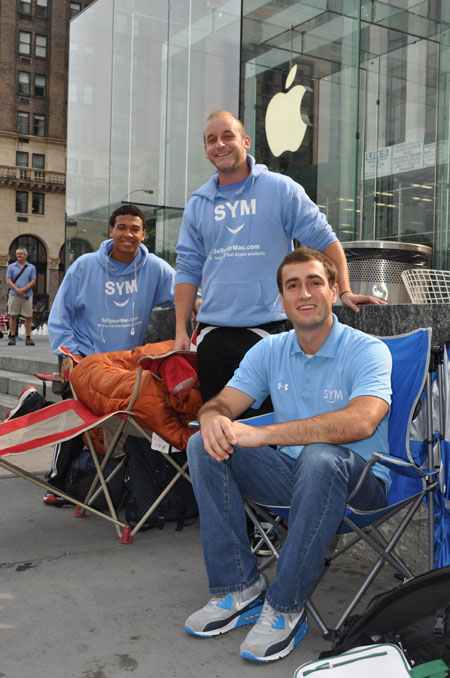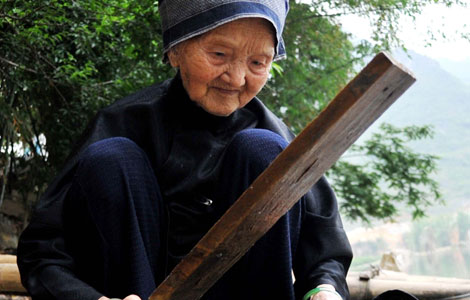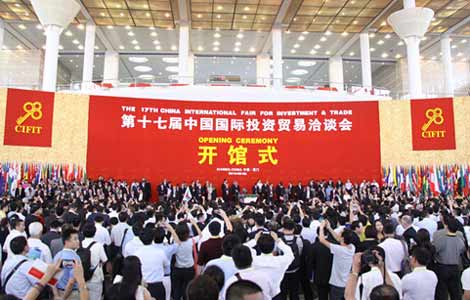New iPhones a dud in China, so far
Updated: 2013-09-11 09:42
By YU WEI in San Francisco (China Daily)
|
|||||||||||
 |
|
Brian Ceballo (from left), Justin Lockhart and Jon Murphy are the first buyers of new iPhone 5S and 5C at Apple Inc’s flagship store on the Fifth Avenue in New York on Tuesday, 10 days ahead of the official delivery of the new gadgets. This year, China will be also among the first markets to deliver the new models. Bai Jie / For China Daily |
Apple Inc finally lifted the curtain on its long awaited new devices, including a cheaper model of iPhone 5, but Chinese consumers, the second-largest market for the electronics giant and a main target of the new model, are already calling the offering a disappointment.
Cupertino, California-based Apple released its new models — iPhone 5S and the cheaper iPhone 5C — on Tuesday, after months of waiting and wide-spread speculation, especially over the new model which carries the hopes of Apple regaining momentum in emerging markets such as China and India.
The iPhone 5C is made of plastic and comes in five colors: green, white, blue, pink, and yellow.It’s hoped that yellow — often associated with gold — will attract many fans in China.
However, users in China criticize the pricing of the iPhone 5C as too high to be called a low-end iPhone. According to Apple’s Chinese website, the starting price for iPhone 5C is 4,488 yuan or $728 in China, a price that is not that much cheaper than the higher-end iPhone 5S, which starts at 5,288 yuan or $858. Most analysts expectedthe price for the budget iPhone is at least $200 higher than the $400-to-$500 level.
For the first time, China will be among the markets to sell new iPhones first on Sept 20, a gesture of Apple’s growing attention to the market.
In a survey conducted by Sina, the dominant news portal in China, only 2.6 percent of more than 35,000 respondents said they would consider buyingan iPhone 5C and 89.4 percent or31,000 respondents said it was “too expensive” as of 8 pm Eastern Standard Time.
With a retail price of more than $700 in China, whether or not a budget iPhone will succeed in China remains up in the air, as competition in the low-end smartphone industry in the country grows fiercer.
“Apple's new iPhone 5C will still be at the higher band of the mid-range smartphone products in the Chinese market,” said Bryan Wang, an analyst at Forrester Research Inc. “For competitive vendors like Xiaomi, who is offering high-configuration models below $350,it’s unlikely they’ll be highly affected by the introduction of iPhone 5C.”
Apple’s highly anticipated partnership with China Mobile was not announced this morning. But sources have said Apple will deliver iPhones using the TD-LTE standard, a 4G mobile standard of which China Mobile is the major user. The Beijing-based Chinese carrier has more than 700 million subscribers, the largest in the world, and is the only Chinese carrier which does not have a contract with Apple and the biggest hope for the American giant to renew its previous glory in China.
“Previous versions of iPhone users can only use 2G services on the China Mobile network. Now with upcoming 3G/4G enabled iPhone models, it will certainly drive further adoption for consumers using iPhone,” said Wang. “With China Mobile offering subsidies for post-paid users with contracts, it will also be very attractive to China Mobile customers to sign up for iPhone plans, while they could only buy iPhones at retail in the past.”
Wang believes that Apple will be able to leverage retail networks of China Mobile, the China's largest wireless carrier that has more than 60,000 retail stores across tier 1 to tier 6 cities in China. “With this partnership, Apple could strengthen its iPhone retail networks a couple of fold compared to what they have now,” he said.
“For China Mobile, they can finally tie up high-end users with iPhone contracts, with higher data speeds with iPhones in 3G/4G standards,” Wang added.
“I think it's a mistake not to more aggressively pursue a larger part of the market with a phone at $400 (still more expensive than most of market),” said Scott Galloway, a professor of marketing at New York University’s Stern School of Business. “The (marginally) lower price doesn't do enough to warrant a different product.”
However, Andy Tsay,chair for operations management and information systems at the Leavey School of Business at Santa Clara University, believes the iPhone 5C will see some kind of success and with a smaller price band, Apple can still maintain its brand image of high-end gadgets.
“The subsidy model in China is different from the US market, which makes the handset price very transparent to consumers,” said Nicole Peng, an analyst with research firm Canalys. “Consumers need to pay up front and operators' subsidies kick in later. Therefore, even with operator subsidy, consumers who have a set budget are still very cost conscious.”
“How to price the device in China is going to be very tricky for Apple, as consumer expectations are very high and if Apple can get it right, it can help Apple to explore to a completely new segment that it wasn't able to address, such as university students, consumers in the tier-3, -4 cities, for example,”Peng said.
Apple has faced some serious challenges in the world's largest smartphone market lately. The California-based technology giant fell to seventh place with a market share of 4.8 percent and a total of 4.3 million device shipments in China.
Collectively, the top five Chinese vendors — Lenovo, Yulong, Huawei, ZTE and Xiaomi — shipped the most devices worldwide, accounting for 20 percent of the total market, up from less than 15 percent a year ago, even though few people outside China have heard of companies like Yulong or Xiaomi.
Apple stock fell $11.53, or 2.28 percent, Tuesday to close at $494.64.
yuwei12@chinadailyusa.com
Related Stories
Early China iPhone launch squeezes smugglers 2013-09-11 08:22
China Unicom, Telecom to sell latest iPhone 2013-09-06 16:07
iPhone deal expected soon 2013-08-16 07:48
Apple iPhone slips in rank 2013-08-09 12:15
iPhone price makes the difference 2013-08-01 09:36
Fewer Chinese consumers picking Apple's iPhone 2013-07-25 00:36
Today's Top News
StanChartered, HSBC 'poised to enter FTZ'
Kerry to meet Russian counterparts
German Bach elected as IOC president
Li vows to provide more jobs
Xi travels along ancient trade route
Trending news across China
China Southern flies to London with new 787
August's data signal stronger growth
Hot Topics
Lunar probe , China growth forecasts, Emission rules get tougher, China seen through 'colored lens', International board,
Editor's Picks

|

|

|

|

|

|





